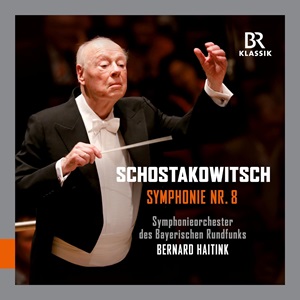
Dmitri Shostakovich (1906–1975)
Symphony No 8, Op 65 (1943)
Bavarian Radio Symphony Orchestra/Bernard Haitink
rec. live, September 2006, Philharmonie im Gasteig, Munich, Germany
BR Klassik 900214 [65]
It came to mind while listening to this recording that it owes its existence to a fluke of destiny that had occurred thirty years prior. The death of Rudolf Kempe, Decca’s first choice to record its integral cycle of the Shostakovich symphonies, allowed Bernard Haitink the opportunity to record, and therefore, become identified with, them.
The pairing of the abstemious Haitink and some of the most hellacious orchestral music of the 20th century was an unlikely one on paper. No surprise, then, that the consequent recordings were variable in quality, notwithstanding that long-time critical consensus has since suggested otherwise. Disciplined playing and impressive sonics were the saving graces of Haitink’s Shostakovich recordings for Decca, but this live recording with the Bavarian Radio Symphony Orchestra, sadly, has no such redeeming virtues. So slack unto narcoleptic is this interpretation, that I assumed it was a product of Haitink’s last years and the photograph of the conductor on the cover suggests as much. Imagine my astonishment when I read in the booklet that this recording was made in September 2006, during the conductor’s late prime.
One would never guess from Haitink’s glacial rendering of the first movement, announced by soggy inflection of its opening motif, that Shostakovich was a still-thirty-something composer at the time he completed his Eighth Symphony. Pervaded by tragedy though it is, the work also thunders, apocalyptic with outrage at the horrors, wartime and otherwise, it chronicles, as can be heard in the 1982 live recording by Yevgeny Mravinsky (best heard on Altus ALT-312). Although at the time of the recording the Russian was two years older than his Dutch counterpart, he was operating in another dimension wholly apart, successfully conveying in full this symphony’s expressive breadth. Haitink’s quintessential interpretive temperance in this 2006 performance, on the other hand, borders on indolence. Galumphing geriatrically right through the climax, he robs the movement of its ferocity and, in the English horn solo that follows the climax, its sombre beauty.
The succeeding two scherzi are no better, the performance of the central moto perpetuo movement arguably being the low point of Haitink’s work on records. Inordinately smooth articulation of the outer sections’ ostinato figure frames the playing of the trio’s solo trumpet, who sounds as if he were Bobby Hackett stumbling bleary-eyed into Munich after a late-night jam session with Jackie Gleason.
Haitink’s affinity for Brucknerian expanses benefits the final two movements. Both have moments of alluring playing—particularly the coda’s violin and cello solos—but these are far too little and late to dispel the torpor that characterizes this performance.
Interpretively similar on the surface are Inoue Michiyoshi and the New Japan Philharmonic in their 2021 recording of Shostakovich’s Eighth Symphony (Exton OVCL-00761). Yet, in spite of often being slower, they seem faster thanks to their emphatic playing, harder edge, and the superior production which cumulatively produce a cogency missing in this Haitink recording.
Congruent with this desultory performance is the accompanying booklet essay by Christian Wildhagen. His ex post facto attempts at Mickey Mousing an external program to the music are remarkable enough. But that, in 2024, he is still perpetuating the lie that the Soviets devised the still-born “Stalingrad” nickname for the symphony out of embarrassment for its cataclysmic mood is dumbfounding. (It was, in fact, coined by the American press after Artur Rodziński conducted the stateside premiere in New York City.)
This lamentable posthumous supplement to Haitink’s discography should have stayed buried in the Bavarian Radio archives.
Néstor Castiglione
Buying this recording via a link below generates revenue for MWI and helps us keep free access to the site




















